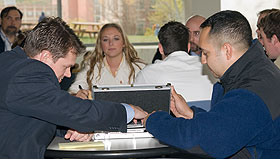  |
| HOME | THIS ISSUE | CALENDAR | GRANTS | BACK ISSUES | < BACK | NEXT > |
Accounting majors try their hand at investigating tax fraudby David Bauman - November 26, 2007 | ||||
| “Special tax agents” Jose Garcia and Demetrios Psarofagis – whose day jobs are studying accounting at UConn’s School of Business – recently found themselves across a table from Chris Shots, owner of Cheaters Bar, who was trying to sell them his business for $3.2 million. Shots was detailing how he pocketed $1,000 a night from his cash-only bar and was still able to file annual tax returns showing gross profits in excess of $1.1 million. What the bar owner didn’t know was that an hour earlier, an informant ratted on his defrauding ways to his would-be buyers, the two students playing the role of undercover tax agents. As the conversation progressed, Garcia and Psarofagis deftly teased out of Shots that he owed taxes, that he had failed to report all his income, and that his plan to defraud the government was intentional – all elements the “agents” would need in order to take the case to trial. Cracking crimes with accounting? Not everyone at the Internal Revenue Service (IRS) has a desk job. Some special agents from the Criminal Investigation Division of the IRS have more in common with famous FBI agent Elliot Ness than with regular accountants. Just as Agent Ness caught the notorious mobster Al Capone on tax evasion charges, the special IRS agents – known as certified forensic examiners – use a combination of high-tech resources and old-fashioned sleuthing to investigate tax fraud in order to catch cheats, drug dealers, money launderers, and terrorist financiers. That’s what the IRS was trying to demonstrate to 25 UConn accounting students last week, by hosting a mock fraud investigation of several crime scene scenarios using teams of accounting students to try and solve the crimes. The program, known as the Adrian Project, teaches accounting students the investigative techniques of an agent, said JoAnn Zuniga, head of the IRS Criminal Investigation Boston Field Office. The agency’s Criminal Investigation Division has more than 100 special agents located in the Northeast investigating not only tax crimes, but also money laundering and financial reporting crimes, she said. “Today[’s event] gives these students the opportunity to begin to think like a special agent,” Zuniga said. “They need to be creative in asking questions that will make an investigation progress, and creative in deciding what needs to be done to complete an investigation.” This is the first time the IRS has hosted the event in Connecticut, said Cliff Nelson, assistant professor of accounting. Since the scenarios were designed to draw on the students’ accounting knowledge, training, and logic to solve the cases, all the participants were accounting majors in their junior or senior year. “The program gives students a great opportunity to learn what a fraud investigator does,” Nelson said. “It also gives them a chance to take charge in a simulated situation.”
As part of the day-long program, 14 IRS special agents played roles in the mock fraud investigation, such as Chris Shots in the Cheaters Bar. In their cameo roles, the hard-nosed real-life agents dodged questions and verbally argued and fought with the student agents, giving the scenarios an extra air of reality. Besides Cheaters Bar, other scenarios involved a race track gambler, a drug dealer, a money launderer, and a mail clerk involved in fraud. The simulations involved digging through trash for bank statements, anonymous phone calls, surveillance, witness interrogations, and executing search warrants. “We try to create situations that mimic real life crime scenes,” said special agent Richard Murray of the IRS field office in Hartford. “The play-acting agents will lie and act out, and the students must keep their cool and ask the right questions. We guide them, but it isn’t a cakewalk.” The collaboration between the IRS and UConn is part of a continuing effort by the IRS to show that the agency works in ways people don’t usually think about, said Zuniga. The IRS Criminal Investigation Division is the only federal agency authorized to investigate tax fraud, money laundering, and health care fraud. And since Sept. 11, 2001, the agency has devoted a significant amount of resources to investigating terrorist financing, she said. Zuniga said the Adrian Project is a good recruitment tool for the IRS, but added that the agency receives thousands of applications annually. The job requires a college degree in business and applicants must be older than 23. Beginning salaries range between $55,000 and $60,000. “We don’t do a lot of publicity,” she said. “Many people don’t even know there is a criminal investigation division in the IRS.” Accounting major Ashley Ferrara, president of the Beta Alpha Psi accounting society, which worked with the IRS to bring the program to UConn, called the hands-on interactions and life-like simulations an “eye-opening” experience. “We were living in a story instead of just taking notes in a classroom,” said Ferrara, who intends to seek a career in forensic accounting. “This is what it’s really like.” |
| ADVANCE HOME UCONN HOME |

